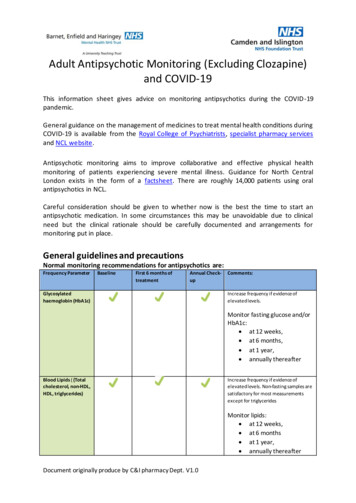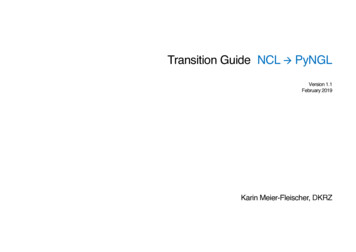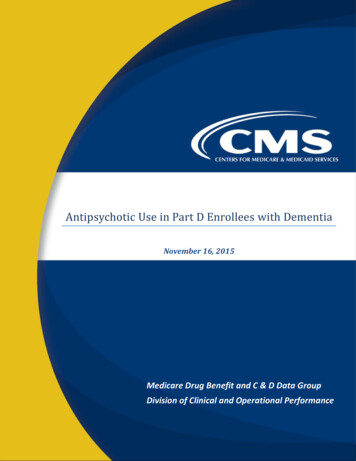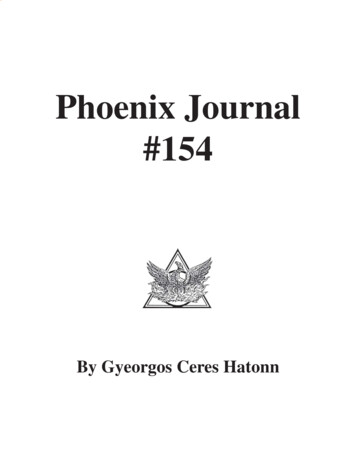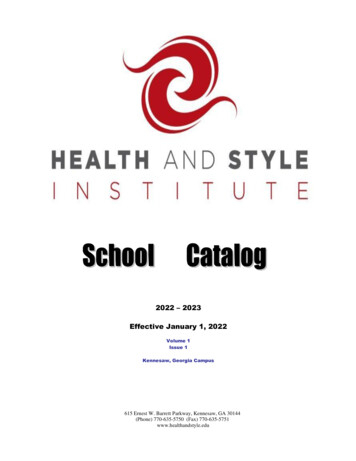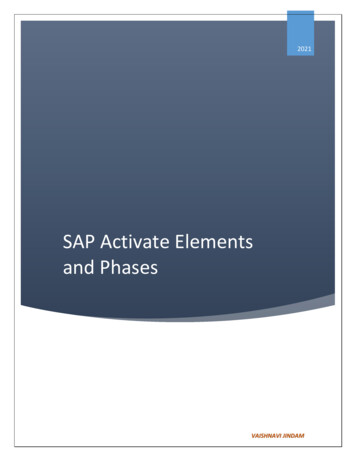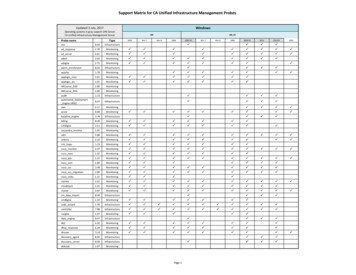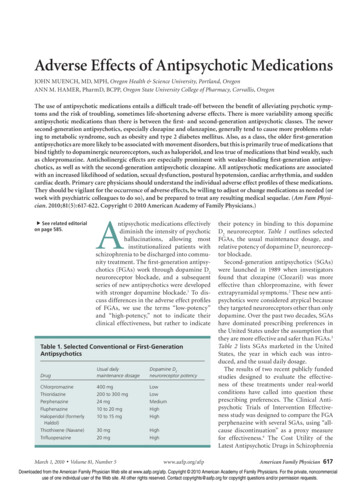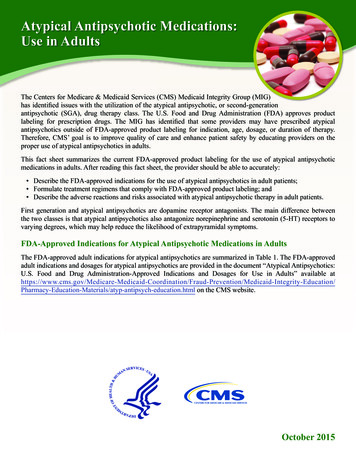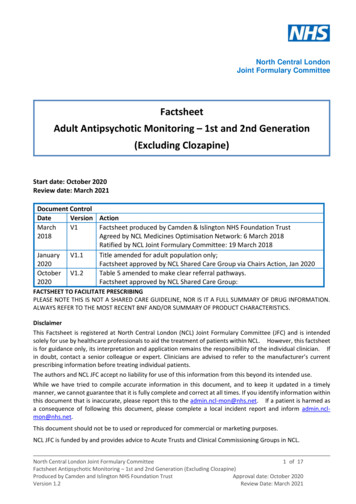
Transcription
North Central LondonJoint Formulary CommitteeFactsheetAdult Antipsychotic Monitoring – 1st and 2nd Generation(Excluding Clozapine)Start date: October 2020Review date: March 2021Document ControlDateVersion ActionMarchV1Factsheet produced by Camden & Islington NHS Foundation Trust2018Agreed by NCL Medicines Optimisation Network: 6 March 2018Ratified by NCL Joint Formulary Committee: 19 March 2018January V1.1Title amended for adult population only;2020Factsheet approved by NCL Shared Care Group via Chairs Action, Jan 2020October V1.2Table 5 amended to make clear referral pathways.2020Factsheet approved by NCL Shared Care Group:FACTSHEET TO FACILITATE PRESCRIBINGPLEASE NOTE THIS IS NOT A SHARED CARE GUIDELINE, NOR IS IT A FULL SUMMARY OF DRUG INFORMATION.ALWAYS REFER TO THE MOST RECENT BNF AND/OR SUMMARY OF PRODUCT CHARACTERISTICS.DisclaimerThis Factsheet is registered at North Central London (NCL) Joint Formulary Committee (JFC) and is intendedsolely for use by healthcare professionals to aid the treatment of patients within NCL. However, this factsheetis for guidance only, its interpretation and application remains the responsibility of the individual clinician. Ifin doubt, contact a senior colleague or expert. Clinicians are advised to refer to the manufacturer’s currentprescribing information before treating individual patients.The authors and NCL JFC accept no liability for use of this information from this beyond its intended use.While we have tried to compile accurate information in this document, and to keep it updated in a timelymanner, we cannot guarantee that it is fully complete and correct at all times. If you identify information withinthis document that is inaccurate, please report this to the admin.ncl-mon@nhs.net. If a patient is harmed asa consequence of following this document, please complete a local incident report and inform admin.nclmon@nhs.net.This document should not be to used or reproduced for commercial or marketing purposes.NCL JFC is funded by and provides advice to Acute Trusts and Clinical Commissioning Groups in NCL.North Central London Joint Formulary Committee1 of 17Factsheet Antipsychotic Monitoring – 1st and 2nd Generation (Excluding Clozapine)Produced by Camden and Islington NHS Foundation TrustApproval date: October 2020Version 1.2Review Date: March 2021
Factsheet – Antipsychotics – 1st and 2nd Generation (excluding clozapine)Indication informationRefers to individual antipsychotic, 1st and 2nd Generation (excluding clozapine), for licensed indication:schizophrenia and other psychosis, mania, bipolar disorderAntipsychotic medication is usually initiated by a specialist.Check list and actions for GP:1. Ensure documented communication has been received from a specialist including: Indication for use Dose and frequency of medication Duration of treatment Baseline investigations Patient has been counselled on the antipsychotic (including side effects/risks/pregnancy)2. Before continuation in primary care ensure that the patient meets criteria for continuation oftreatment (i.e. antipsychotic treatment is initiated by a specialist and the patient is stabilised ontreatment)3. Conduct necessary blood test monitoring at agreed schedule (see Clinical Monitoring section) andcommunicate results to the mental health team if required4. Prescribe routine supplies of antipsychotic5. Monitor the patient’s overall physical health and well-being6. Discuss with a specialist or refer the patient back to the specialist if the patient: Relapses Is intolerant of side effects Is non-compliant with medicines (or this is suspected) Experiences adverse events Has a change in circumstances affecting treatment (e.g. pregnancy)Note: Clozapine is not included in this factsheet as it is a Red Listed medication not routinely prescribed inprimary careDose and AdministrationRefer to individual manufacturer’s Summary of Product Characteristics (SPC) and also current BNF.For your local formulary please see:Camden & Islington Mental Health Trust FormularyBarnet, Enfield and Haringey Mental Health formularyRenal impairment3: No medication clearly preferred to another, however:Avoid sulpiride and amisulpride as primarily renally excretedAvoid highly anticholinergic medication because they may cause urinary retentionFor further information on renal impairment for specific antipsychotic medication see SPC/BNF.North Central London Joint Formulary Committee2 of 17Factsheet Antipsychotic Monitoring – 1st and 2nd Generation (Excluding Clozapine)Produced by Camden and Islington NHS Foundation TrustApproval date: October 2020Version 1.2Review Date: March 2021
Hepatic impairment3: Most antipsychotics are hepatically metabolised and may require a dose reduction or beavoided (See Appendix 1 for choice in specific medication conditions).Discontinuing treatment3: The decision to stop antipsychotic medication requires a thorough risk-benefitanalysis for each patient. Advice should be requested from a specialist. Withdrawal of antipsychotic medicationafter long-term treatment should be gradual and closely monitored. The relapse rate, in the first 6 months afterabrupt withdrawal, is double that seen after gradual withdrawal (defined as slow taper down over at least 3weeks for oral antipsychotics or abrupt stopping of depot preparations). Abrupt withdrawal may also lead todiscontinuation symptoms (e.g. headache, nausea, insomnia) in some patients.Adverse EffectsIf concerned about side effects the Glasgow antipsychotic side effect scale (GASS) is a helpful tool to assess andmonitor side effects. Consider referral to a specialist for patients scoring 22 (moderate side effects).Adverse effects vary between individual antipsychotics.Significant adverse effects related to antipsychotics4: Extrapyramidal side-effects (EPS), Weight gain,Hypertension, Postural hypotension, Sedation, Sexual dysfunction, Hyperprolactinaemia, Impaired glucosetolerance, Dyslipidaemia.Serious4: Psychotropic-related QTc prolongation, Neuroleptic Malignant Syndrome (NMS)For further information on side effects for specific antipsychotic medication see SPC/BNF. Healthcareprofessionals are asked to report any suspected adverse reactions using the Yellow Card Scheme.Contra-indications: Hypersensitivity to the active substance or to any of the excipients.Special Warnings and Precautions for Use: Antipsychotics can have an influence on the ability to drive and usemachines due to potential nervous system and visual effects.Pregnancy and Breastfeeding4: When consideration is given to prescribing psychotropics to any woman ofchildbearing age, appropriate counselling regarding contraception and the risks of pregnancy (including relapse,risks associated with stopping or changing medication and risk to foetus) should be given. (See Appendix 1)Note: when switching from medicines known to raise prolactin to one which reduces prolactin a change in fertilitycan occur which can result in an unplanned pregnancy (see page 7 for details of effect on prolactin).Drug Interactions (See Appendix 2)Please refer to SPC/BNF for full information on interactions with drug name and how to manage theseinteractions.North Central London Joint Formulary Committee3 of 17Factsheet Antipsychotic Monitoring – 1st and 2nd Generation (Excluding Clozapine)Produced by Camden and Islington NHS Foundation TrustApproval date: October 2020Version 1.2Review Date: March 2021
Clinical MonitoringTable 3 Clinical Monitoring5Frequency ParameterGlycosylatedhaemoglobin (HbA1c)Blood Lipids (Totalcholesterol, non-HDL,HDL, triglycerides)BaselineFirst 6 months oftreatmentSee text 1See text 2Annual Check-upComments:Increase frequency if evidence of elevatedlevels.Increase frequency if evidence of elevatedlevels. Non-fasting samples are satisfactory formost measurements except for triglyceridesFBCRepeat FBC if there are signs and symptoms of ablood dyscrasiaLFTsRepeat LFTs if there are signs of liver toxicityU&Es &Renal FunctionTFTsBaseline and annual check-up only required for patients with bipolar affective disorder & 6 monthly for rapidcycling bipolar affective disorder.Quetiapine is associated with small (clinically insignificant decreases in thyroid hormones so annual monitoringmay be advisable)CPKRepeat if there are signs and symptoms of NMSProlactinConsider repeating level 6 - 12 months after initiation. Amisulpride, Risperidone and theTypical Antipsychotics are associated with hyperprolactinaemia. Repeat if there are signs ofraised prolactin.ECGWhere possible offer all patients an annual ECG, especially where other risk factors exist.Baseline ECG for all patients especially if there are specific CV risk factors e.g. high BP. Duringtherapy the need for ECG monitoring should be assessed on an individual patient basis.BP & PulseSee commentsMonitor BP during titration if there are riskfactors for postural hypotension e.g. olderadultsWeight & BMISee text 3Smoking StatusSide EffectsMay interact with antipsychotic metabolismIf concerned about side effects an optional toolto determine if the patient is suffering fromexcessive side effects from antipsychoticmedication is the Glasgow antipsychotic sideeffect scale (GASS)Where a patient refuses any monitoring an explanation should be given to them of the purpose of monitoring andthe risks involved with continuing treatment without monitoring. The decision to continue treatment withoutNorth Central London Joint Formulary Committee4 of 17Factsheet Antipsychotic Monitoring – 1st and 2nd Generation (Excluding Clozapine)Produced by Camden and Islington NHS Foundation TrustApproval date: October 2020Version 1.2Review Date: March 2021
monitoring should be discussed with the patient and specialist. Patients who refuse any monitoring should bereoffered monitoring at regular opportunities.The clinical Monitoring guidance above should be used in conjunction with the intervention framework (LesterUK adaptation) for monitoring physical health6. If a person has rapid or excessive weight gain, abnormal lipid levelsor problems with blood glucose management, consider a referral to a specialist.1. Glucose and Diabetes monitoring5Increases in glucose occur early on after initiating treatment with antipsychotics and may be difficult to reverse.As changes in glycosylated haemoglobin (HbA1c) occur only after a few weeks, fasting glucose tests should becarried out in preference to HbA1c after treatment initiation. In the long-term blood glucose control can bemonitored using HbA1c (as this is more feasible to arrange for patients), however fasting glucose together withHbA1c is preferred at all time-points to determine immediate and long-term impact on blood glucose. Wherethere is concern about the validity of the HbA1c reading (e.g. in HIV or sickle cell disease) then fasting glucoseshould always be used. Where a patient also has HIV, discuss concerns about blood glucose levels with their HIVconsultantMonitor fasting glucose and/or HbA1c: at 12 weeks,at 6 months,at 1 year,annually thereafterIncreased frequency of testing should be considered for patients at risk of diabetes or where results are high.Medicines that are High Risk for causing diabetes include clozapine and olanzapine.All patients should be given dietary and lifestyle advice to help prevent the development of diabetes.Management of high glucose should be in line with NICE guidance “type 2 diabetes in adults: 8Diabetes UK provides guides on diet and ion-for-yourpatients/enjoy-food-guides.aspx? ga 1.66869926.963122193.1465136301Further diabetes guidelines by NCL JFC can be found at: http://ncl-mon.nhs.uk/faq/guidelines/The Lester UK adaptation tool for monitoring physical health provides further advice on threshold values used inblood glucose monitoring.North Central London Joint Formulary Committee5 of 17Factsheet Antipsychotic Monitoring – 1st and 2nd Generation (Excluding Clozapine)Produced by Camden and Islington NHS Foundation TrustApproval date: October 2020Version 1.2Review Date: March 2021
2. Cholesterol and Lipid monitoring5Increases in cholesterol and triglycerides can occur after initiating antipsychotics and may continue to increaseover the longer term if they are not managed. Increased cholesterol is an established risk factor forcardiovascular disease and intervention to treat dyslipidaemia is known to reduce morbidity and mortality.Monitor lipids: at 12 weeks,at 6 monthsat 1 year,annually thereafterPatients with high cholesterol should be given dietary advice and may need treatment in line with NICE guidanceon “cardiovascular disease: risk assessment and reduction, including lipid 181?unlid 737326192016290182Patients with diabetes in particular may need aggressive treatment to lower cholesterol.Further advice on the management of antipsychotic induced dyslipidaemia is available in the British Associationof Psychopharmacology guideline on the management of weight gain, metabolic disturbances and cardiovascularrisk associated with psychosis and antipsychotic treatment: https://www.bap.org.uk/pdfs/BAP GuidelinesMetabolic.pdfThe NHS provides information on cholesterol including information on how to reduce ts/Pages/Cholesterol.aspxFurther statin prescribing and lipid modification guidelines by NCL JFC can be found at: http://nclmon.nhs.uk/faq/guidelines/The Lester UK adaptation tool for monitoring physical health provides further advice on threshold values used inblood lipid monitoring.3. Weight Gain and Weight monitoring5Weight gain occurs early on after initiating treatment with antipsychotics and is difficult to reverse. It istherefore important to monitor weight closely during initiation and intervene promptly where weight gain occurs.Patients should be encouraged to weigh themselves and keep a record which can be discussed at each contact.Monitor weight: weekly for the first 6 weeks,at 12 weeks,at 1 year,annually thereafterMedicines that are High Risk for causing weight gain include clozapine and olanzapine. Quetiapine andrisperidone have a moderate risk of causing weight gain. Haloperidol has a low risk of causing weight gain and toa low extent.North Central London Joint Formulary Committee6 of 17Factsheet Antipsychotic Monitoring – 1st and 2nd Generation (Excluding Clozapine)Produced by Camden and Islington NHS Foundation TrustApproval date: October 2020Version 1.2Review Date: March 2021
All patients should be given dietary and lifestyle advice to prevent weight gain. Lifestyle interventions are first linefor reversing weight gain.The NHS provides a range of resources on healthy eating and weight loss. lthyeating.aspxThe Lester UK adaptation tool for monitoring physical health provides further advice on threshold values used inweight monitoring.Management of abnormal resultsQTc prolongation3,4The QT interval broadly relates to the duration of cardiac repolarisation. Some antipsychotics are linked toprolongation of the cardiac QT interval, a risk factor for the ventricular arrhythmia torsade de pointes, which isoften fatal. Overall risk is probably dose-related. Medicine interactions (involving enzyme inhibition) areimportant (See Appendix 2 for medication interactions).See Appendix 3 for risk factors for QT prolongation.Table 4: Management of QT prolongation in patients receiving antipsychotic medicines3,4.QTcActionRefer tocardiologist 440msec (men) or 470msec (women)None unless abnormal T-wave morphologyConsider if indoubt 440msec (men) or 470msec Consider referral to specialist to reduce dose or Consider(women), but 500msecswitching to a medicine of lower effect; repeat ECG 500msecRepeat ECG. Stop suspected causative medicine(s) and Immediately refer to specialist to switch to a medicine of lower Same dayeffectAbnormal T-wave morphologyReview treatment. Refer to specialist to consider Immediately reducing dose or switching to a medicine of lower Same dayeffect.Correct electrolyte disturbances (potassium and magnesium) if presentHyperprolactinaemia3,4Dopamine inhibits prolactin release and so dopamine antagonists can be expected to increase prolactin plasmalevels. All antipsychotics cause measurable increases in prolactin but some do not increase prolactin above thenormal range at standard doses.Hyperprolactinaemia is often superficially asymptomatic and there is some evidence that Hyperprolactinaemiadoes not affect subjective quality of life. Persistent elevated levels of plasma prolactin is associated with sexualdysfunction, reductions in bone mineral density, menstrual disturbances, breast growth, galactorrhoea,suppression of the hypothalamic-pituitary-gonadal axis, and a possible increase in the risk of breast cancer.North Central London Joint Formulary Committee7 of 17Factsheet Antipsychotic Monitoring – 1st and 2nd Generation (Excluding Clozapine)Produced by Camden and Islington NHS Foundation TrustApproval date: October 2020Version 1.2Review Date: March 2021
Antipsychotics that reduce prolactin levelAntipsychotics that increase prolactin levelAntipsychotics not usually associated withhyperprolactinaemiaAripiprazoleAmisulpride, sulpiride, risperidone, paliperidone and firstgeneration antipsychoticsAripiprazole, asenapine, clozapine, lurasidone, olanzapine,quetiapine and ziprasidoneTable 5: Prolactin concentration 30 -2500mIU/lRefer to Psychiatrist. Consider a systematicassessment of prolactin-related side effects anddiscussion of clinical consequences. 2500mIU/lRefer to Endocrinologist. Need referral for tests torule out prolactinoma.Take blood sample at least 1 hour after waking or eating.Minimise stress during venupuncture (stress elevates plasma prolactin).0-530mIU/L0-424mIU/LExtrapyramidal side effects (EPSE)Including Dystonia (uncontrolled muscular spasm), Pseudo-parkinsonism (tremor etc.), Akathisia (restlessness),Tardive dyskinesia (abnormal movements) should be considered for a referral to a specialist for a review.Neuroleptic malignant syndrome (NMS) 3,4Neuroleptic malignant syndrome is a rare, but potentially serious or even fatal adverse effect of all antipsychotics.It is a syndrome of muscular rigidity and sympathetic hyperactivity occurring as a result of dopaminergicantagonism in the context of psychological stressors and genetic predisposition.Signs and symptoms (Presentation varies considerably): Fever, diaphoresis, rigidity, confusion, fluctuatingconsciousness, fluctuating blood pressure, tachycardia, elevated creatinine kinase, leucocytosis, altered liverfunction tests.Risk factors for NMS: high potency first generation antipsychoticsrecent or rapid dose increaserapid dose reductionabrupt withdrawal of anticholinergicsantipsychotic polypharmacyagitationdehydrationpsychosisorganic brain diseasealcoholismParkinson’s diseasehyperthyroidismpsychomotor agitationmental retardationIf Neuroleptic malignant syndrome suspected the patient must be sent to A&ENorth Central London Joint Formulary Committee8 of 17Factsheet Antipsychotic Monitoring – 1st and 2nd Generation (Excluding Clozapine)Produced by Camden and Islington NHS Foundation TrustApproval date: October 2020Version 1.2Review Date: March 2021
High Dose Antipsychotic Therapy4High dose antipsychotic therapy (HDAT) is defined as a total daily dose of a single antipsychotic which exceeds theupper limit stated in the SPC or BNF with respect to the age of the patient and the indication being treated or atotal daily dose of two or more antipsychotics which exceeds the SPC or BNF maximum using the percentagemethod. The percentage method requires converting the dose of each medicine into a percentage of the BNFmaximum recommended dose for that medicine and adding these together (See Antipsychotic Dosage ReadyReckoner). A cumulative dose of more than 100% is high dose antipsychotic prescribing.Doses of antipsychotics prescribed above the maximum licensed dosages are off-label. The GP must be informedof the off-label use of the medicine and be willing to accept clinical and legal responsibility for prescribing. Thespecialist is responsible for ensuring that appropriate information is provided to the GP and the GP agrees tocontinue the prescription. If the GP does not wish to continue the prescription this needs to be discussed with thespecialist recommending treatment.High doses of antipsychotics might worsen already compromised cognitive function in their patients (particularlyolder people). High dose antipsychotics have a greater liability for extrapyramidal side effects for whichanticholinergic/anti-Parkinsonism medicines might be required which also may worsen cognitive function. Doserelated side effects include extrapyramidal side effects, tachycardia, postural hypotension, sedation, seizures, andhyperprolactinamia.Additional monitoring will be advised by the specialist. All patients on HDAT should have regular ECGs (baseline,when steady state serum levels have been reached after each dosage increment and then every 6 to 12 months).Additional biochemical/ECG monitoring is advised if medicines that are known to cause electrolyte disturbancesor QTc prolongation are subsequently co-prescribed (Appendix 3 Risk factors for QT prolongation)North Central London Joint Formulary Committee9 of 17Factsheet Antipsychotic Monitoring – 1st and 2nd Generation (Excluding Clozapine)Produced by Camden and Islington NHS Foundation TrustApproval date: October 2020Version 1.2Review Date: March 2021
Contact Details and Further Information:Camden and Islington NHS Foundation TrustMental Health Advice and Assessment TeamAddress: 4 St Pancras Way, St Pancras Hospital, London, NW1 0PE, United KingdomPhone number: 020 3317 7300Email: cim-tr.aat-referrals@nhs.netOpening hours Monday - Friday 9.00am - 5.00pmOther specialist contact –Crisis Resolution Team: Phone number 020 3317 6333This number is available 24 hours a day, 7 days a week.Barnet, Enfield and Haringey Mental Health NHS TrustCrisis Resolution and Home Treatment Team (CRHT) serviceUrgent outreach service, assessing service users 24 hours a day, 7 days a week.BoroughBarnetEnfieldHaringeyAddress1st floor, Dennis Scott Unit, EdgwareIvy House, Chase Farm HospitalLea Unit, St. Ann’s HospitalTelephone0208 702 40400208 702 38000208 702 6700Fax0208 702 42020208 702 50620208 442 5890GP Advice LineAn advice line is available for GPs who would like to speak to a consultant about any mental health issue.Telephone number: 0208 702 3997Phone line operational Monday - Friday 9am – 5pmCalls received by 12.45pm will be responded to by a consultant between 1pm and 2pm on the same day. Calls taken after 12.45pmwill result in a call back the following day.http://www.beh-mht.nhs.uk/gps-and-referrers/To find a Summary Product Characteristics: https://www.medicines.org.uk/emc/The Choice and Medication Website is a patient friendly website which can be provided to patients. Leaflets onmedications, including in different languages and formats and fact sheets on a number of areas including weight gain,hyperprolactinaemia, EPSEs and metabolic adverse effects.Headmeds is a unique new website about mental health medication for young people aged 13-25. It has been createdby YoungMinds and funded by Comic Relief and the Nominet Trust as part of the Innovation Labs project which hasdeveloped a range of digital projects to improve young people's mental health.North Central London Joint Formulary Committee10 of 17Factsheet Antipsychotic Monitoring – 1st and 2nd Generation (Excluding Clozapine)Produced by Camden and Islington NHS Foundation TrustApproval date: October 2020Version 1.2Review Date: March 2021
References1. Summary of Product Characteristics, https://www.medicines.org.uk/emc/2. BNF 73, March 2017 – September 20173. Taylor D. Paton C., Kapur S. Editors. The South London and Maudsley NHS Foundation Trust.Oxleas NHS Foundation Trust. Prescribing Guidelines. 12th Edition. London. Wiley Blackwell(2015).4. Antipsychotic Prescribing Guideline (PHA35), Camden and Islington NHS Foundation Trust,May 20165. Summary of Physical Health Monitoring with Mood Stabilisers & Antipsychotics, Central andNorth West London NHS Foundation Trust, Updated August 2016 (Version 04.0.0)6. Positive cardio metabolic health resource, Lester UK Adaptation, 2014 updatewww.rcpsych.ac.uk/quality/NAS/resourcesNorth Central London Joint Formulary Committee11 of 17Factsheet Antipsychotic Monitoring – 1st and 2nd Generation (Excluding Clozapine)Produced by Camden and Islington NHS Foundation TrustApproval date: October 2020Version 1.2Review Date: March 2021
Appendix 1: Choice of medication in specific medical conditions3,4MedicalSuggested antipsychoticAvoid if aloperidol, sulpiride,Chlorpromazine (avoid completely)amisulprideDepot antipsychoticsLoxapine (not available in the UK)Lurasidone (experience limited) asenapine (experiencelimited)Zotepine (avoid completely) (not available in the UK)PregnancyChlorpromazine(constipation and sedationmay occur)Trifluoperazine,Haloperidol, OlanzapineQuetiapine, Clozapine(gestational diabetes maybe a problem with allatypical antipsychotics).There is most experiencewith the above, althoughsafety not fully establishedDepot antipsychotics(Anticholinergics)North Central London Joint Formulary Committee12 of 17Factsheet Antipsychotic Monitoring – 1st and 2nd Generation (Excluding Clozapine)Produced by Camden and Islington NHS Foundation TrustApproval date: October 2020Version 1.2Review Date: March 2021CommentsConsider referral to specialist and neurologistThe majority of antipsychotics decrease the seizurethreshold.Clozapine – very epileptogenic. Approximately 5% whoreceive more than 600mg/day develop seizures. Sodiumvalproate or lamotrigine are the anticonvulsants of choiceas they have a lower incidence of leucopenia thancarbamazepine. None of the depot preparations currentlyavailable are thought to be epileptogenic.The kinetics of depots are complex (seizures may bedelayed). If seizures do occur, the offending medicinesmay not be easily withdrawn. Depots should be used withextreme care.Beware pharmacokinetic interactions with anticonvulsants(see Appendix 4).Consider referral to specialist perinatal services. Discusswith the patient the absolute and relative risks associatedwith treating and not treating the mental disorder duringpregnancy and the postnatal period. If patient establishedon another antipsychotic, the most up-to-date adviceshould always be obtained. A change in treatment may notbe necessary or wise.
Appendix 1: Choice of medication in specific medical conditions3,4Breastfeeding OlanzapineClozapineRenalimpairmentNo agent clearly preferredto another.However for typicalantipsychotic, suggesthaloperidol 2-6mg/day; foratypical agent, suggestolanzapine 5mg/daySulpirideAmisulprideDepot antipsychoticsMedicines known to prolong QTc interval Highlyanticholinergic agents (risk of urinary retention)HepaticimpairmentLow dose Haloperidol,Sulpiride (no dosagereduction required if renalfunction is normal)Amisulpride (no dosagereduction required if renalfunction is normal)Paliperidone: if a depot isrequired.Sedative or constipating medicines, e.g. chlorpromazine,clozapine (risk of hepatic encephalopathy).Avoid medications hepatotoxic in their own right e.g.MAOIs, chlorpromazine, clozapine. Avoid medicines witha long-half life or those that need to be metabolised torender them active.Depot idoneClozapineOlanzapinePaliperidoneAvoid QT-prolonging medicines in ischaemic heartdisease, and those which increase heart rate.North Central London Joint Formulary Committee13 of 17Factsheet Antipsychotic Monitoring – 1st and 2nd Generation (Excluding Clozapine)Produced by Camden and Islington NHS Foundation TrustApproval date: October 2020Version 1.2Review Date: March 2021Consider referral to specialist perinatal services. Thebenefits of breastfeeding to the mother and infant mustbe weighed against risk of medicine exposure in the infant.Infant exposure can be decreased by timing feeds to avoidpeak medicine levels.Consider referral to specialist. Olanzapine and clozapinemay cause or aggravate diabetes, a common cause ofrenal disease.Avoid medicines known to prolong QTc interval. Inestablished renal failure, electrolyte changes are commonso it may be best to avoid antipsychotics with the greatestrisk of QTc prolongation. Weight gain (a risk withantipsychotics) may predispose to diabetes which cancause rhabdomyolysis and renal failure. Be vigilant fordystonias and NMS (as the resulting rhabdomyolysis cancause or worsen renal failure). Rhabdomyolysis can occurwithout symptoms of NMS.Consider referral to specialist. Monitor Liver function tests(LFTs) weekly, at least initially. If LFTs deteriorate after anew medicine is introduced, consider switching to anothermedicine. One third of patients who are prescribedantipsychotics have at least one abnormal LFT and in 4% atleast one LFT is elevated three times above the upper limitof normal. Transaminases are mostly affected and thisgenerally occurs within 1-6 weeks of treatment initiation.Only rarely does clinically significant hepatic damageresult.Consider referral to specialist. In permanent AF with ratecontrol medicine choice is less crucial, but probably best toavoid medicines with potent effects on the ECG(ziprasidone, pimozide, sertindole) and those whichincrease the heart rate.
Appendix 1: Choice of medication in specific medical conditions3,4HIVAtypical antipsychotics(risperidone most widelyused).Quetiapine, aripiprazoleand olanzapine may also beused.Clozapine not routinely recommended
North Central London Joint Formulary Committee 4 of 17 Factsheet Antipsychotic Monitoring - 1st and 2nd Generation (Excluding Clozapine)

